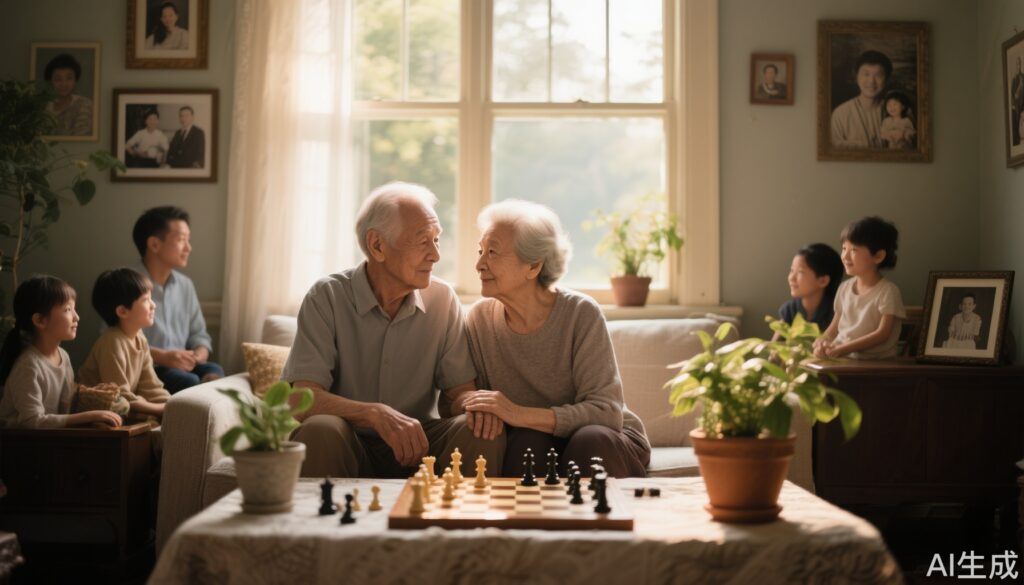Introduction: Beyond the Numbers—Understanding Aging After 70
Turning 70 is a profound milestone. Yet, many people notice a startling trend: a significant number of seniors pass away not long after reaching this age. While chronic illnesses and natural physiological decline certainly play roles, recent research and psychological insights suggest the story is much more complex. The years following 70 are a crossroads where body, mind, and social circumstances intersect, heavily influencing the trajectory of an individual’s later life.
This article explores the scientific and practical reasons why aging after 70 can be particularly challenging—and, crucially, how six key ‘cards’ or strategies can dramatically improve not only how long we live, but how well we live.
The Science of Aging: What the Data Tell Us
Aging is a multifaceted process, involving physical, psychological, and social changes. Epidemiological data show that life expectancy at birth has increased globally, but the risk of mortality rises steeply after 70. According to the World Health Organization, over 40% of people aged 70 and above live with at least one chronic health condition. However, studies reveal that psychological factors—such as depression, perceived social isolation, and loss of purpose—can accelerate physical decline and even increase mortality risk (Holwerda et al., 2016).
Neuroscientific research demonstrates that the brain’s resilience to stress diminishes with age, making older adults more vulnerable to emotional upheaval. For example, a longitudinal study published in “The Lancet Psychiatry” found that persistent feelings of loneliness and hopelessness in seniors were associated with a 20–30% increase in all-cause mortality (Luo et al., 2012).
Case Vignette: John’s Story
John, a retired engineer, celebrated his 70th birthday surrounded by family. But within a year, he found himself feeling irrelevant, disconnected, and increasingly anxious. His health—once robust—began to falter. His story is not uncommon; it encapsulates the silent struggles many seniors face as they navigate the realities of aging.
Psychological and Social Triggers: More Than Just Physical Decline
Researchers and clinicians note three major psychological and social triggers that can accelerate decline after age 70:
1. **The Realization of Aging:** Many seniors, for the first time, truly feel old at 70. This awareness can trigger emotional instability, with previously optimistic individuals becoming more pessimistic or anxious.
2. **Perceived Social Exclusion:** Seniors often struggle to keep pace with rapidly changing technology and culture. This can fuel feelings of being left behind, misunderstood by younger generations, or even unwanted—emotions that are often more perception than reality.
3. **Loss of Family Role:** Traditionally, older adults played a central role in family decisions. But physical frailty can shift this dynamic, leaving seniors feeling like a burden rather than a pillar of support.
These factors, if unaddressed, can lead to a downward spiral—accelerating both physical and mental decline.
Common Misconceptions and Harmful Behaviors
– **”It’s All About Physical Health”:** Focusing exclusively on managing chronic diseases while neglecting emotional and social wellbeing is a common pitfall.
– **”Older Adults Should Step Aside Completely”:** Withdrawing from family affairs or community life can fuel isolation and depression.
– **”Feeling Down Is Normal at This Age”:** Persistent sadness or anxiety is not a normal part of aging and deserves attention.
The Six Essential ‘Cards’: Practical Strategies for Longevity and Happiness
Experts recommend proactively building six foundational supports—or ‘cards’—to thrive beyond 70:
1. Companionship (The Spouse Card):
Having a caring partner or close confidant is a powerful buffer against loneliness and depression. Studies consistently show that emotional support from a spouse or close friend reduces stress and improves health outcomes (Umberson & Karas Montez, 2010).
2. A Home of One’s Own (The Nest Card):
Security and autonomy are vital. Maintaining your own space—however modest—provides psychological comfort and a sense of control. Seniors who feel at home are less prone to depression and cognitive decline.
3. Financial Security (The Reserve Card):
Managing personal savings and maintaining some financial independence, however small, reduces anxiety and fosters self-worth. This doesn’t mean wealth, but having enough for daily comfort and occasional enjoyment.
4. Physical Health (The Health Card):
Regular exercise, balanced nutrition, and managing chronic conditions are foundational. But equally important is maintaining a proactive, rather than reactive, approach to health—emphasizing prevention and regular check-ups.
5. Friendships (The Friends Card):
Staying socially active, whether by meeting friends in person or online, is crucial for mental stimulation and emotional wellbeing. Social engagement is linked to lower rates of dementia and depression (Fratiglioni et al., 2004).
6. Joyful Living (The Happiness Card):
Cultivating hobbies, humor, and a positive outlook can strengthen resilience. Even small pleasures—gardening, volunteering, or learning something new—act as psychological lifelines.
| Key Area | Why It Matters | Practical Tips |
|---|---|---|
| Companionship | Reduces loneliness, improves mood | Regular date nights, open communication, mutual support |
| Home | Fosters security, independence | Personalize your space, maintain routines, welcome visits |
| Financial Security | Reduces anxiety, enables autonomy | Budgeting, small indulgences, seek advice as needed |
| Physical Health | Enables active living | Exercise, routine check-ups, balanced diet |
| Friendships | Sharpens mind, boosts joy | Weekly calls, join clubs or online groups |
| Joyful Living | Promotes resilience | Pursue hobbies, embrace humor, celebrate small wins |
Expert Insights: Commentary from the Field
Dr. Laura Bennett, a geriatric psychologist, notes: “It’s not just about treating diseases. Seniors thrive when they feel needed, engaged, and secure. These six ‘cards’ are like pillars holding up the house of healthy aging.”
Social policy also matters. Communities that invest in age-friendly environments—safe parks, accessible healthcare, and vibrant social centers—see better outcomes for their seniors.
Conclusion: Preparing for the Golden Years
The transition after age 70 is a delicate phase, not solely defined by physical health but by complex psychological and social shifts. While some decline is inevitable, much suffering can be prevented. By proactively cultivating companionship, security, financial stability, physical health, friendship, and joy, seniors can tip the odds toward both longevity and happiness. The real secret to aging well is not just in living longer, but in living better—one well-played card at a time.
References
– Holwerda, T.J., et al. (2016). “Feelings of loneliness, but not social isolation, predict dementia onset: Results from the Amsterdam Study of the Elderly (AMSTEL).” Journal of Neurology, Neurosurgery & Psychiatry, 87(2), 135-142.
– Luo, Y., Hawkley, L.C., Waite, L.J., & Cacioppo, J.T. (2012). “Loneliness, health, and mortality in old age: A national longitudinal study.” Social Science & Medicine, 74(6), 907-914.
– Umberson, D., & Karas Montez, J. (2010). “Social relationships and health: A flashpoint for health policy.” Journal of Health and Social Behavior, 51(S), S54-S66.
– Fratiglioni, L., Paillard-Borg, S., & Winblad, B. (2004). “An active and socially integrated lifestyle in late life might protect against dementia.” The Lancet Neurology, 3(6), 343-353.


